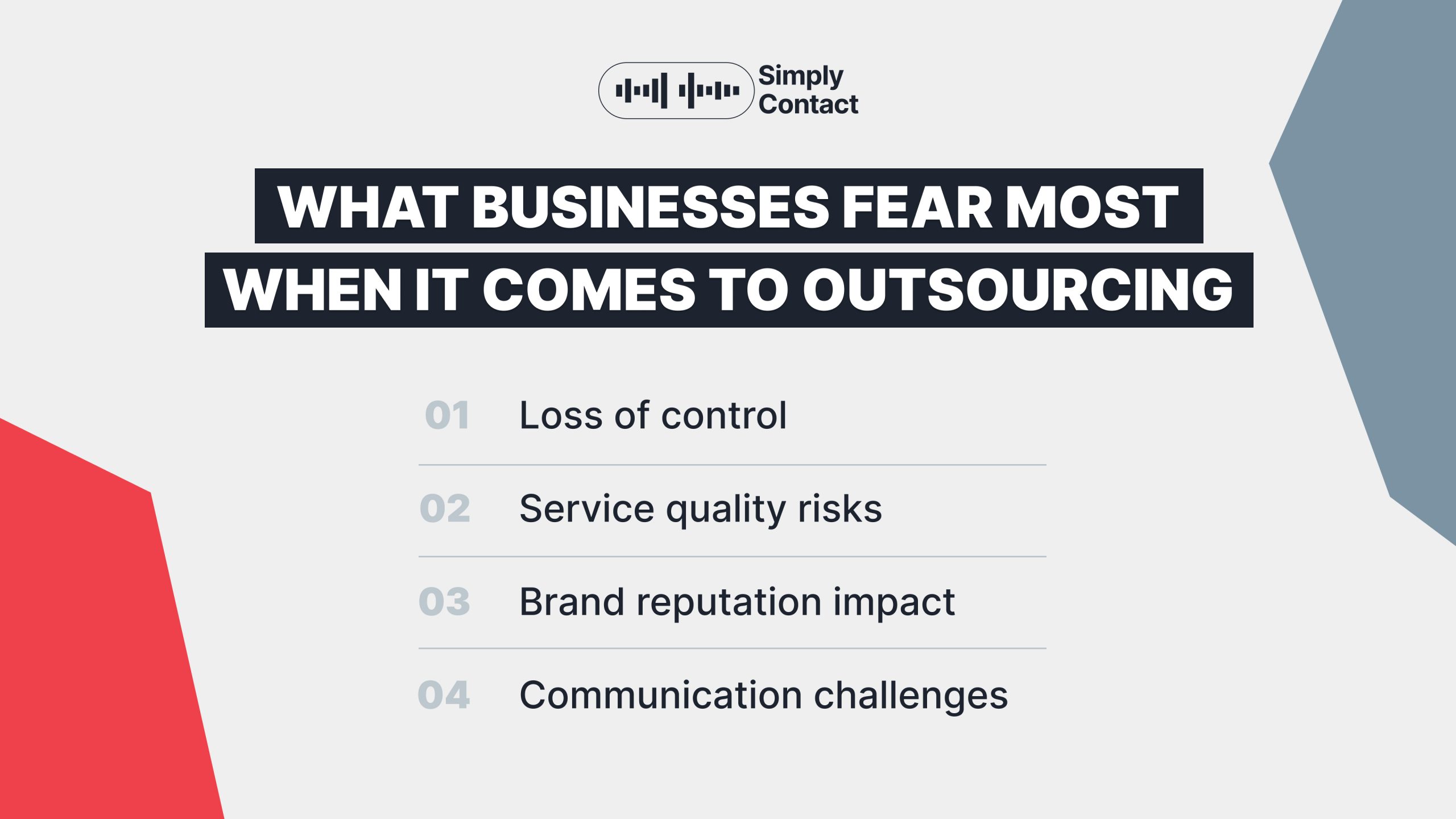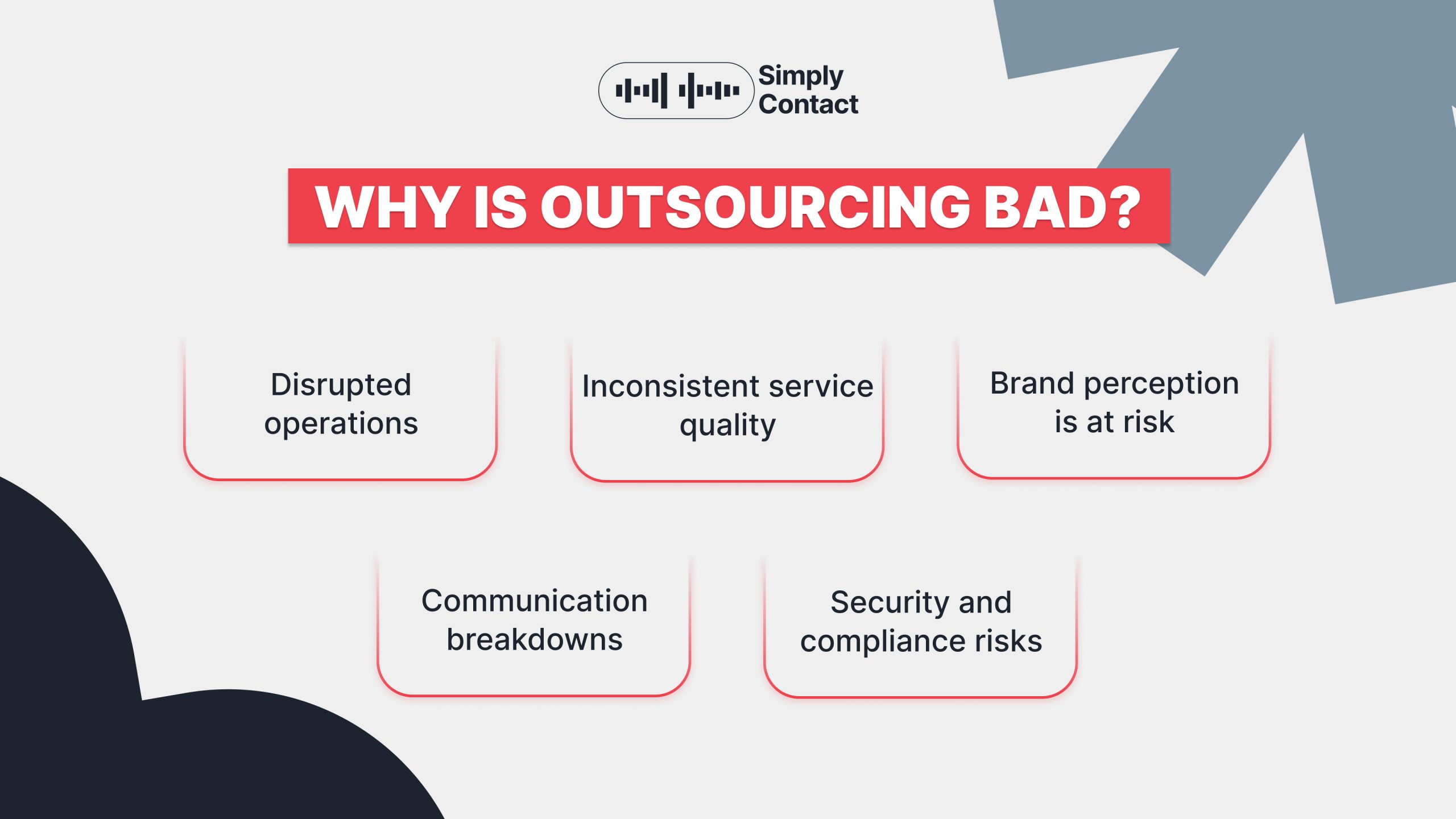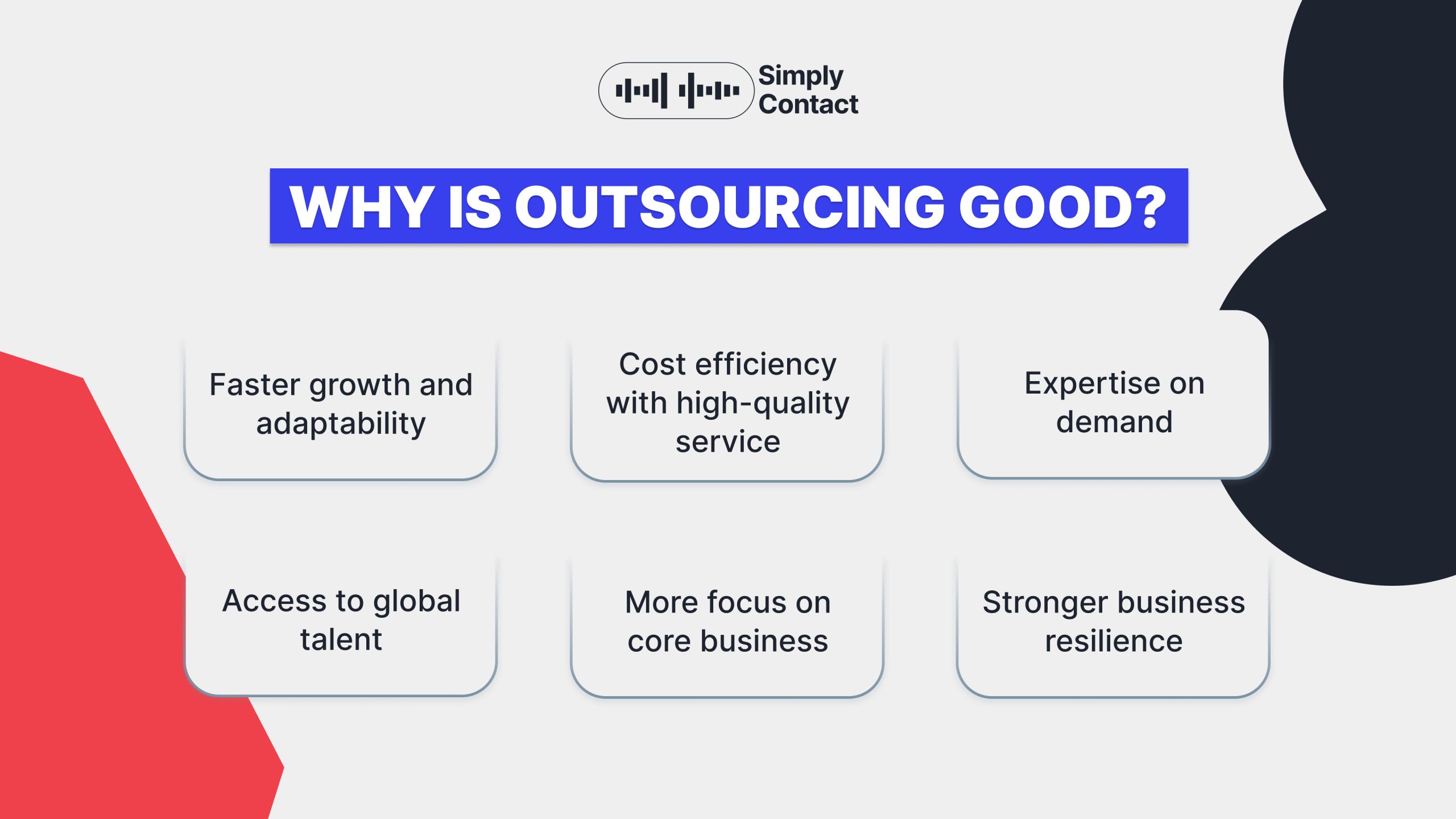Discover how a reliable partner can make all the difference.

Outsourcing is often seen as a cost-cutting tool, but it’s not the only reason for its popularity worldwide. Businesses use outsourcing to streamline operations, access specialized expertise, and stay competitive in a changing market. Yet, for companies with little to no experience in outsourcing, the decision isn’t always straightforward. Will it improve efficiency? How will it affect service quality? What are the risks?
This article breaks down the key challenges and benefits of outsourcing, helping you make an informed choice and finally decide: is outsourcing good or bad?
Types of outsourcing
Before we dive into the advantages and disadvantages of outsourcing, let’s get things straight about the bigger picture, defining what types of outsourcing are there. Outsourcing can take different forms depending on where the service provider is located. Location matters when it comes to challenges, as well as the benefits of using third-party vendors. The three primary types are:
Onshore outsourcing
Partnering with a provider within the same country. This option minimizes language barriers and cultural differences, ensuring smoother collaboration and better alignment with local regulations. It offers limited cost savings, making it less attractive for businesses focused on reducing expenses. Companies often choose onshore outsourcing when maintaining full compliance with local laws and quality standards is a top priority.
Nearshore outsourcing
Outsourcing to a nearby country, often in the same or a similar time zone. This approach balances cost efficiency with easier communication and cultural compatibility. Businesses requiring real-time collaboration or concerned about significant time zone gaps often prefer nearshoring. For example, Polish companies commonly outsource to Ukraine, while UK businesses often nearshore to Eastern Europe or Portugal.
Offshore outsourcing
Working with a provider in a distant country, typically to access lower costs. This model is preferred by companies aiming to maximize savings while benefiting from specialized expertise. A U.S. company outsourcing customer support to the Philippines is a common example of offshore outsourcing. While this approach can significantly reduce labor costs, businesses must also account for potential challenges like regulatory differences and service quality monitoring. Time zone differences may require process adjustments, such as implementing overlapping work hours or using advanced collaboration tools.
What businesses fear most when it comes to outsourcing
There are different forms of outsourcing, and its popularity is undeniable. And yet, for companies new to outsourcing, the decision often comes with hesitation. While cost savings and efficiency gains are appealing, several concerns make businesses question what are the advantages of outsourcing in the presence of these concerning factors.
Loss of control
To a business owner, outsourcing can feel like entrusting their life's work to a complete stranger. It’s not just about shifting tasks—it’s about handing over execution, decision-making, and quality to an external team. For some, this loss of control breeds uncertainty. Will the outsourced team uphold the company’s standards? Will they make the right calls when it matters most? Businesses fear that even a slight misalignment can tarnish a carefully built reputation.
Service quality risks
Another concern is the possibility that an outsourcing partner may not uphold the same standards as an in-house team. Differences in training, company culture, and performance expectations can affect consistency. Ensuring quality requires careful vendor selection, clear performance metrics, and ongoing monitoring. Some companies hesitate to outsource complex or high-touch customer interactions, preferring to keep them in-house to maintain tighter control.
Brand reputation impact
Customers associate their experience with the brand, not the service provider. If outsourced support is slow, unhelpful, or inconsistent, it can damage customer trust and loyalty. This is particularly concerning for businesses that rely on premium service as a competitive advantage, such as financial institutions or luxury brands.
Communication challenges
Language barriers, cultural differences, and time zone gaps can complicate collaboration. Misaligned expectations, delayed responses, or ineffective communication channels can reduce efficiency and lead to frustration on both sides.

Why is outsourcing bad?
These concerns are completely valid, especially for businesses new to working with third-party providers. We hear them all the time. Outsourcing can go wrong in many ways, and when it does, the consequences are serious. A single bad experience can be enough to make a business swear off outsourcing forever. But the real problem isn’t outsourcing itself; it’s poor service quality, miscommunication, and weak partnerships. So, what are the most common disadvantages of outsourcing, or rather, outsourcing-related reservations? Let’s break it down.
Disrupted operations
If the provider makes decisions that don’t align with business priorities, service levels can drop, customers can be affected, and internal teams may struggle to coordinate. In industries where brand consistency is critical, this loss of control can severely weaken brand identity.
Inconsistent service quality
Some outsourcing providers cut corners, sacrificing quality to maximize cost savings. This can result in undertrained staff, high turnover, and inconsistent performance. A poor outsourcing choice can lead to slow response times, ineffective customer interactions, and an overall decline in service standards—damaging customer trust and making recovery difficult.
Brand perception is at risk
Customers don’t care whether a company handles support in-house or through an external provider. They judge based on experience. If an outsourced team delivers poor service, the company, not the provider, takes the hit. In this scenario, no matter what are the benefits of outsourcing, they will be outweighed by its downsides.
Communication breakdowns
If an outsourcing partner operates in a different country, language barriers, cultural differences, and time zone mismatches can create misunderstandings, delays, and operational friction. These issues become even more damaging in fast-paced environments where real-time responses are critical. Without clear processes and strong coordination, outsourcing can slow things down rather than improve efficiency.
Security and compliance risks
Handing over sensitive customer data to an external provider introduces risks. If a provider fails to meet security standards, businesses may face data breaches, regulatory penalties, and legal consequences. This is especially dangerous in industries with strict compliance requirements, such as healthcare and finance, where outsourcing mistakes can result in heavy fines or loss of customer trust.These situations are undeniably concerning and can make a business reject outsourcing altogether. But the problem isn’t outsourcing itself—it’s providers who fail their clients with poor service and lack of commitment. When partnering with a company that prioritizes quality, compliance, and accountability, these risks fade into the background. And that’s when the real advantages of outsourcing become clear.

Why is outsourcing good?
Outsourcing isn’t just a cost-cutting measure—it can also be a powerful growth strategy. Businesses that partner with a reputable BPO provider gain efficiency, flexibility, and access to top-tier expertise without the challenges of hiring, training, and managing large teams. Done right, outsourcing benefits operations and gives companies a competitive edge.
Faster growth and adaptability
Business opportunities don’t wait for hiring cycles. Recruiting and training in-house teams takes time, but outsourcing provides instant access to skilled professionals. Companies can scale operations up or down based on demand, whether handling seasonal spikes, expanding into new markets, or launching new services.
Cost efficiency with high-quality service
One of the most impressive advantages of outsourcing is its ability to deliver the same, if not better, service quality at a reasonable cost. Regional cost advantages and economies of scale mean businesses can optimize budgets without sacrificing expertise. Customer support outsourcing alone, done efficiently, can cut costs by up to 70% while maintaining excellent service standards.
A quick consultation can reveal how cost-effective support solutions work for companies like yours.
Book a call
Expertise on demand
Building in-house capabilities for every function isn’t always practical. Outsourcing connects businesses with specialists who bring industry knowledge, advanced tools, and best practices. Whether it’s help desk services, technical support, social media support services, or compliance-heavy processes, outsourcing ensures businesses have the right expertise without the overhead.
Access to global talent
Limiting hiring to a single location means competing for the same talent pool, often at a premium. Another benefit of outsourcing is ditching these barriers by providing access to a broader range of skilled professionals while service quality and efficiency don’t drop. This is particularly valuable for companies struggling with talent shortages in their home markets.
More focus on core business
Managing support functions like customer service, IT, or payroll requires time and resources that could be better spent on strategy, innovation, and growth. Outsourcing shifts the operational burden to experienced providers, allowing businesses to concentrate on what sets them apart.
While many outsourcing companies focus only on meeting KPI goals, the right partner also looks ahead. For example, we at Simply Contact work to understand your business goals and suggest effective solutions, like AI customer care tools, that improve efficiency and support your broader vision.
Stronger business resilience
Companies relying solely on in-house teams face risks—talent shortages, sudden surges in demand, or operational disruptions can slow them down. Outsourcing provides a built-in contingency plan, ensuring business continuity even in times of uncertainty.
If outsourcing comes with risks, why do businesses keep turning to it? Because when done right, it provides flexibility, access to specialized expertise, and the ability to scale efficiently. The key isn’t just outsourcing itself. It’s largely choosing the right partner and setting it up for success. Companies that approach it thoughtfully strengthen their operations, ensuring quality and efficiency while adapting to changing demands.

So, should you choose outsourcing or not?
Outsourcing is a strategic decision that depends on a company’s industry, operational needs, and long-term goals. While cost reduction is a major driver, businesses must carefully weigh outsourcing advantages and disadvantages to determine if outsourcing aligns with their priorities.For many companies, outsourcing is an effective way to optimize costs, access specialized expertise, and scale operations without the complexities of in-house hiring. Industries with high customer interaction, such as e-commerce, travel, and fintech, often outsource customer support to ensure 24/7 availability and multilingual service. Businesses focused on operational efficiency, like logistics, telecom, and retail, leverage the pros of outsourcing to streamline workflows and improve service quality.
However, some industries require a more cautious approach. Luxury brands, for instance, prioritize exclusivity and personalized service, making them less likely to outsource customer interactions. Similarly, businesses handling highly sensitive data, such as financial services or healthcare, must ensure strict compliance with security and regulatory standards before outsourcing.
Michael Vainer, CBDO at Simply Contact
The decision to outsource should be based on a company’s specific needs, risk tolerance, and ability to manage an external partnership effectively. The right outsourcing approach, whether nearshoring for better oversight, offshoring for cost efficiency, or a blended model, can provide long-term value if executed strategically. Businesses that conduct thorough vendor evaluations, set clear expectations, and act by acknowledging the pros and cons of outsourcing can make it a powerful tool for growth and efficiency.
How we can help
Since 2013, we've partnered with global leaders to support their operations, handling back-office tasks and a wide range of BPO services with efficiency and care. We understand the challenges businesses face when outsourcing and know that success comes down to the right partnership. With experience, attention to detail, and a commitment to quality, we help companies streamline operations while maintaining control and consistency. For any customer support needs, you’re welcome to reach out to us.
Wondering if outsourcing is the right move? Let us walk you through the numbers. A short consultation can show how leading companies achieve maximum efficiency without cutting corners.
Book a consultation
FAQ
Is outsourcing only for large corporations, or can small businesses benefit too?
Outsourcing works for businesses of all sizes. There’s no standard as to how many agents is right to have. While large corporations may outsource to optimize scale, smaller companies often use it to grow efficiently, access skilled talent, and stay competitive without the overhead of building internal teams from scratch.
How can I make sure outsourcing won’t damage my brand’s reputation?
Choose a provider that understands your brand, not just your KPIs. The right partner will act as an extension of your team, using your tone of voice, matching your quality standards, speaking your required languages fluently (and/or using customer service translation), and proactively offering new initiatives. Transparency and shared values are non-negotiable.
What’s the difference between outsourcing and offshoring?
Outsourcing means handing specific tasks or processes to an external partner. Offshoring refers to moving those tasks to another country. You can outsource locally, nearshore to nearby countries, or offshore to more distant regions, depending on your business's needs: speed, cost-efficiency, or access to talent.
Can I outsource just one part of my operations, or does it have to be all or nothing?
You don’t have to go all in. Many companies start with one function, such as support in a new language, after-hours coverage, or one customer channel, and scale over time based on performance and business needs.
What’s the first step if I’m considering outsourcing but not sure where to start?
Start by identifying where your team needs the most support: high volumes, long response times, or costly operations are good indicators. Then, research providers online or use the advice of someone you know who has used outsourcing. Talk to potential partners. A solid provider will ask the right questions, help you define goals, and show you what a tailored solution could look like.
Get fast answers to any remaining questions
Thank you.
Your request has been sent successfully.
Your request has been sent successfully.






